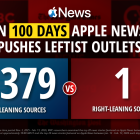
Meta Global Affairs President Nick Clegg made this mea culpa-like admission during a press call on Monday, just days after Meta CEO Mark Zuckerberg visited Mar-a-Lago in what appeared to be an attempt to whitewash his reputation amid his platform’s censorship of conservatives and Republicans.
“We know that when enforcing our policies, our error rates are still too high, which gets in the way of the free expression that we set out to enable,” Clegg claimed, as first reported by The Verge. “Too often, harmless content gets taken down, or restricted, and too many people get penalized unfairly.”
Clegg also alleged Meta regrets its draconian censorship of constitutionally-protected COVID-19 content. As documented in MRC Free Speech America’s exclusive Censortrack database, Meta-owned platforms Facebook and Instagram rank first and fourth among the most censorship-prone social media sites, with 1,412 and 300 cases of censorship, respectively.
“We had very stringent rules removing very large volumes of content through the pandemic,” Clegg conceded three years later. He also opportunistically claimed ignorance about the pandemic’s uncertainties to justify censorship.
“No one during the pandemic knew how the pandemic was going to unfold, so this really is wisdom in hindsight,” he continued. “But with that hindsight, we feel that we overdid it a bit. We’re acutely aware because users quite rightly raised their voice and complained that we sometimes over-enforce and we make mistakes and we remove or restrict innocuous or innocent content.”
Clegg’s comments came ten days after Facebook mistakenly suspended the popular page of firearm manufacturer Smith & Wesson. Facebook ultimately reversed the suspension, which cited alleged bogus violations of its policies on weapons-related content, amid mounting public backlash.
Contrary to Clegg’s ridiculous change of heart, this was not the first time Meta has claimed it had erroneously censored pages and personalities that ran afoul of the left’s preferred narrative. CensorTrack has recorded at least 49 instances where Facebook and Instagram attributed their censorship actions to alleged errors or mistakes. Here are some examples:
- In November 2024, Facebook cited a so-called error after it silenced a post by Sen. Marsha Blackburn on Jeffrey Epstein’s files.
- In October 2024, Facebook temporarily disabled The Western Journal publisher Patrick Brown’s page “in error.” Brown used the censored page to manage the outlet’s main Facebook page.
- In October 2024, Facebook claimed it mistakenly removed a pro-women’s sports ad from Michigan Republican Senate candidate Mike Rogers.
- In August 2024, both Instagram and Facebook alleged they “incorrectly applied” an “Altered photo/video” fact-check label on now-President-elect Donald Trump’s viral raised-fist photo.
- Also in August, a spokesperson admitted that the MetaAI chatbot falsely claimed that the first assassination attempt on Trump was fabricated.
- In 2024, Facebook blamed its “automated systems” for “mistakenly” censoring ads for Reagan, a popular movie about President Ronald Reagan starring Dennis Quaid.
- In May 2024, Meta claimed it “mistakenly blocked” Robert F. Kennedy Jr. from embedding a link to Woody Harrelson’s documentary Who is Bobby Kennedy.
- In November 2023, Instagram disabled—and later reinstated—former Green Party presidential candidate Jill Stein’s page after an apparent error.
- In April 2023, Facebook apologized for temporarily and incorrectly suspending the Kansas Reflector the same day the news site published a column criticizing the social media platform.
- In June 2023, Instagram conceded in exclusive comments to MRC that it had banned Kennedy Jr., then a Democratic presidential candidate, in “error.”
- In May 2023, Facebook alleged that a “bug” caused a post by journalist Matt Taibbi “to be mistakenly deleted for a few minutes.” The censored post was ironically about censorship.
- In August 2022, Meta again cited an “error” when it banned breastfeeding shirt company Bshirt for alleged violations of the platform’s nudity policy.
- In September 2022, Facebook dubiously censored The Falling Man photo, which was shared to commemorate 9/11, and later said, “We’re sorry we got this wrong.”
- In September 2022, Meta incorrectly censored a Holocaust movie named Beautiful Blue Eyes over a false violation of the platform’s policies on race. A spokesperson conveniently alleged the censorship “was made in errror.”
- In January 2021, Facebook claimed to have restricted former Rep. Ron Paul’s page “by mistake,” adding, “We have corrected the error.”
- In December 2020, Instagram temporarily placed a bogus warning label on then-President Trump’s tribute to Pearl Harbor. The label was later removed amid public backlash.
- In November 2020, Instagram claimed it had blocked online personality Ashley St. Clair in “error and we have since addressed it.”
- In October 2020, Facebook relied on a factually inaccurate fact-check by The Dispatch to ban two ads highlighting the pro-abortion stances of then-Democratic presidential candidate Joe Biden and running mate Kamala Harris. When called out, The Dispatch apologized and took down the false fact-check.
- In December 2019, Facebook apologized for mistakenly censoring evangelist Rev. Franklin Graham over a 2016 post rebuking musician Bruce Springsteen for canceling a concert in protest of a bathroom bill.
- In December 2018, The New York Times surprisingly exposed Facebook’s censorship policies as being marred with “numerous gaps, biases and outright errors.”
- In November 2018, Facebook claimed it was “sorry” for mistakenly deleting an ad by the pro-life organization Susan B. Anthony List.
- In August 2018, Facebook apologized to PragerU for “mistakenly” censoring at least nine of its posts. “We’re very sorry and are continuing to look into what happened with your Page,” Meta claimed via X.
Conservatives are under attack. Contact your representatives and demand that Big Tech be held to account to mirror the First Amendment while providing transparency, clarity on hate speech and equal footing for conservatives. If you have been censored, contact us using CensorTrack’s contact form, and help us hold Big Tech accountable.









